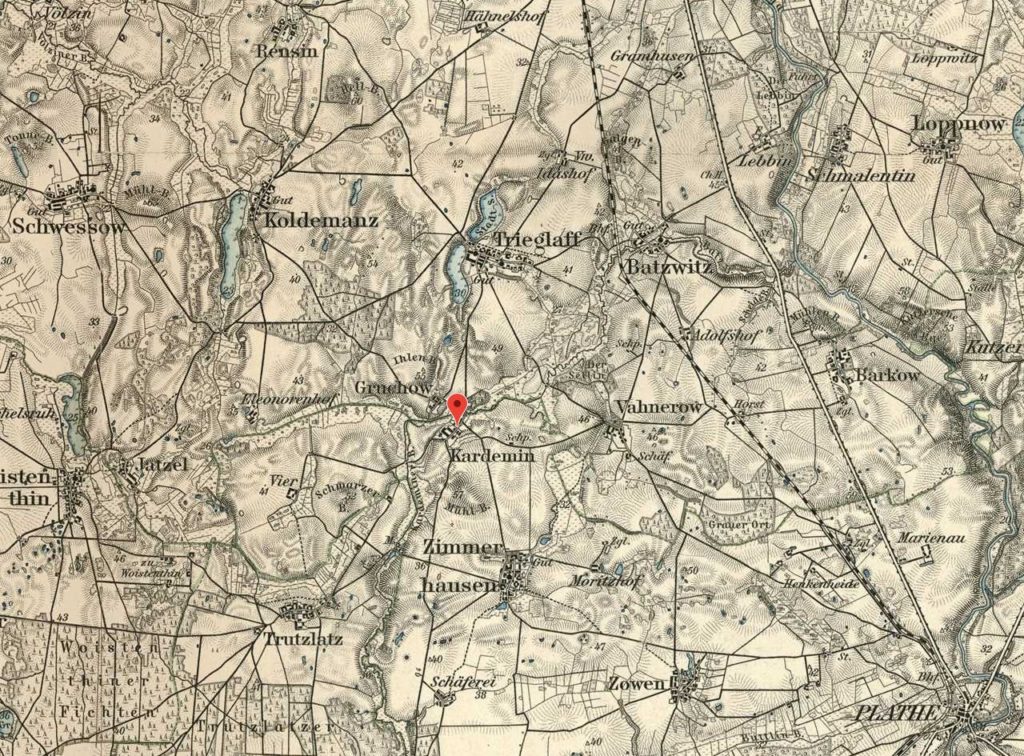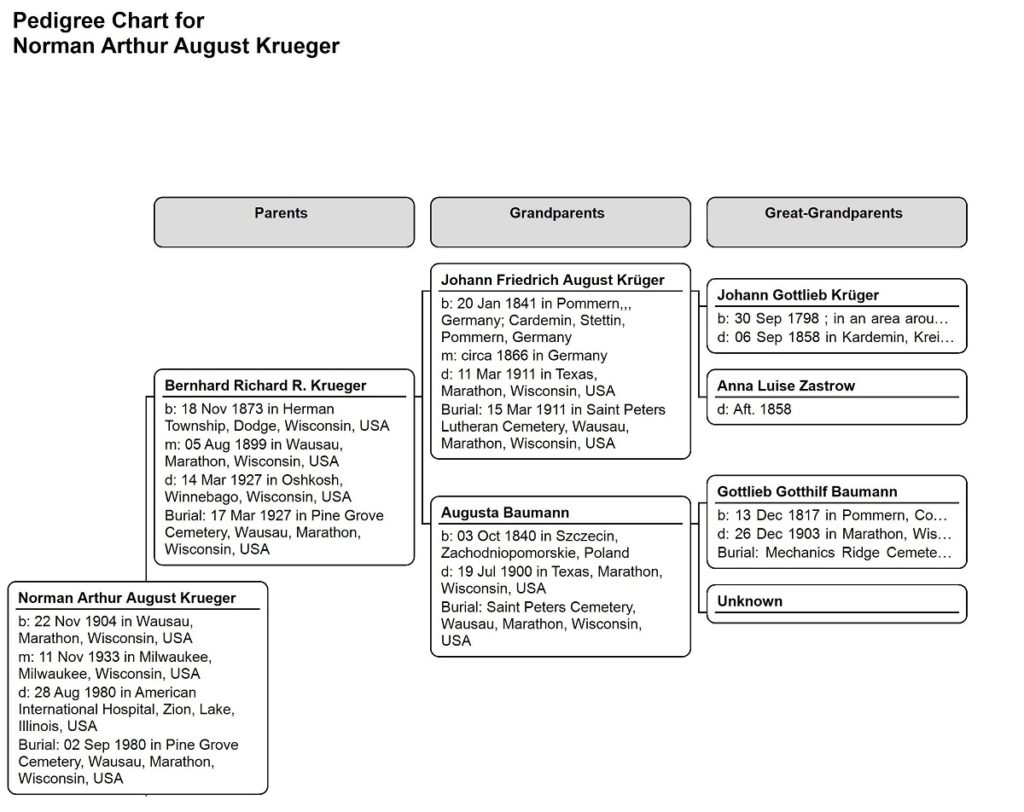I get pretty excited these days when I find a new branch on the family tree. Decades ago when I was just starting out with genealogy, new ancestors were showing up regularly. But nowadays it is pretty rare and usually requires a lot of work. In this post, I will introduce you to two new direct ancestors on the Krueger family tree.
– Denise
Thanks to Keene Winters
Before I get started, I would like to express my deepest thanks and give credit to a distant cousin named Keene Winters. He shares DNA and we have a proven connection to him through the Aschbrenner family. Wilhelmina Mathwich and Friedrich Samuel Aschbrenner are in his family tree. Through that connection, he saw my post on Johann Krueger, Norman Krueger‘s grandpa. That led him to share information.
“sometimes you just get lucky — and in this case you did.”
– Keene Winters
Keene recognized the town Cardemin, Stettin, Pommern, and the name Krueger from a project that he worked on with another researcher named Charles Thomas. He explained that for a long time, they had hit a dead end for the families of Winters, Krueger, Starks and Hoges. The families were in church records in the 1840s and then disappeared, only appearing again in post-1874 civil records. They learned that the families had all joined a break-away Lutheran church, so were not in the traditional church books. The alternate church had a church book. That book was in the Polish National Archives at Stettin, but not online. They made a couple of “test” data requests from the archive that confirmed its contents. Then, they hired a researcher in Germany to cross the border to look at the 630-page book. He returned with some 300 images of birth, death and marriage records for Kruegers, Winters, Hoges and Starks.
These Old Lutheran records were not readily available to the public, so I would not have found them on my own. Keene Winters and Charles Thomas spent considerable time and money on this project. I am indeed very lucky to have connected with Keene and their work.
Cardemin / Kardemin
In 2018, when I wrote about Johann Krueger, I complained about my inability to find much when doing German research. Other researchers had listed his birth place as Cardemin, Stettin, Pommern, but I’d never been able to find any concrete evidence. However, I thought it was very possible that the location was correct since his father-in-law’s immigration record showed he came from that town.
Political boundaries in that region have changed often over time. The town is no longer named Cardemin or known as its alternate spelling of Kardemin. It is now in Poland.

Trieglaff, a Hotbed of Ecumenical Reform
Trieglaff was the parish that served Cardemin. So, our Krueger ancestors would have worshipped there and had their births, marriages, and deaths recorded there. The church records were required and served as the civil records of the time.
Our ancestors were in the middle of things when Trieglaff became one of the centers for the Alt-Lutheran religious movement.
Trieglaff, a small village in rural Pomerania that now sits in the north-west corner of Poland, was overseen by the von Thadden family. The original von Thadden had inherited his estate after Napoleon’s defeat.
Prussian King Friedrich William III unified the Protestant churches in Prussia in 1817 on the 300th anniversary of the Reformation. In 1827, a new church liturgy was introduced. There was a threat of a fine if Pomeranian churches did not use the new liturgy. The King’s long-term goal was to have fully centralized royal control of all the Protestant churches in a Prussian Union of Churches. He wanted the Reformed (Calvinist) and Lutheran churches combined using the same methods of organization and using the same liturgy.
This unification was highly controversial and met with opposition. The Lutherans were especially unhappy. They did not want to abandon the traditions of their faith. The King was not happy with dissent. He wanted full control over church affairs. He aggressively fought for his cause, using the military to confiscate churches and exiling or imprisoning pastors. Lutheran church services were banned.
The feudal lords of the Trieglaff area, the von Thaddens, opposed the unification of the church. So did many of the citizens. Leopold “Julius” Nagel, pastor of the Trieglaff parish quit the United church in 1847 and pretty much took the whole congregation with him. They built their own church and called themselves the Alt-Lutherans (old-Lutherans). By about 1860, there were around 1,300 people in the Alt-Lutheran congregation at Trieglaff. Parishioners came from villages as far as 15 or 20 miles away (a day’s journey back in the mid-1800s) to have their births, deaths, and marriages recorded.
By 1875, the membership at the Alt-Lutheran church in Trieglaff was dwindling. There were only about 800 members and more and more were leaving for religious freedom. Where were they going? They were emigrating!
Before they left the country, our ancestors were recorded in the Alt-Lutheran records at Trieglaff.
Trzygłów, gmina Gryfice, Gryfice County, West Pomeranian Voivodeship, 72-300, Poland
Marriage of Johann “John” and Augusta
Marriage of Johann Friedrich August Krüger, dinstknecht in Cardemin, son of the deceased arbeitsmann Gottlieb Krüger in Cardemin, age 25 and Rosaberta Emilie Augusta Baumann, daughter of the arbeitsmann Gotthilf Baumann in Cardemin, age 26, not previously married, her father gives permission for the marriage on 26 October 1866.
1866 Alt-Trieglaff, Nr. 16.
With all of that background, we can now return to our Krueger family tree.
One of the records obtained by Winters and Thomas was a marriage record for our Johann and Augusta (Norman’s grandparents). Their 26 October 1866 marriage was recorded in the Old Lutheran records at Trieglaff.
The record gave the names of their fathers.
We knew Augusta’s father’s name.
But now we know that Johann’s father’s name was Gottlieb Krüger!!!
Pretty exciting, huh?
We also know some occupations. Johann was listed as a dinstknecht for which no translation is found. However, if the spelling was instead dienstknecht, then he was a servant.
The fathers were both listed as arbeitsmann – workers.
We often tend to think of our ancestors who lived long ago as all being farmers, but that was not the case. Farmland in Europe was scarce. We should not be surprised that they had other jobs before some of them came to America and became farmers.
Birth of Johann’s sister
Kardemin. To the laborer Johann Gottlieb Krüger and his wife Anna Luise Zastrow, a daughter Maria Sophia Elisabeth Krüger, born 7 November 1844 in the evening at 10 o’clock and baptized 27 November 1844. Godparents: The farmhand Johann Zastrow from Kardemin, Mrs. Friedericke Börcher from Kardemin, Miss Hanna Pagenkopf from Kardemin.
1844 Trieglaff, Nr.27.
A record from a couple decades earlier documented the birth and baptism of a sister of Johann Friedrich August Krüger (John Krueger).
That record gives us the name of their mother. She was Anna Luise Zastrow. Another name for the family tree! It also shows that Gottleib Krüger’s full name was Johann Gottleib Krüger.
New Great-Grandparents
With this new information, we can now see the names of two more great-grandparents on Norman Krueger’s family tree. Hooray!

Johann and Anna
The death record for Johann Gottleib Krüger shows his full name as well.
Johann Gottleib Krüger, worker in Cardemin, age 59 years / 11 months / 6 days, died on 6 September 1858, buried on 9 September in Trieglaff. He left behind a widow and four children.
1858 Alt-Trieglaff, Nr. 21
The record provides his death date as 06 Sept 1858. Doing the math we know his birth date was 30 Sep 1798.
The death record also shows that he had at least four children. We know about his son, our ancestor Johann Friedrich August Krüger (John Krueger). But now we know there were at least three others. There may have been more who were deceased before their father.
Winters and Thomas were able to identify our Johann and two others, namely Justine and Maria. We saw Maria’s baptism record earlier. The proof for Justine comes from her marriage record.
Wilhelm Köhler, worker in Zowen, son of worker Martin Köhler in Mittelhagen, age 27, married on 1 April 1859 Justine “Augustine” Krüger, daughter of the deceased Johann Gottlieb Krüger in Cardemin, age 27.
1859 Alt-Trieglaff, Nr. 3
In summary, Johann Gottlieb Krüger was born on 30 Sep 1798 ( in an area around the border between Kreis Regenwalde and Kreis Greifenburg in Pommerania, in the Kingdom of Prussia). He died on 06 Sep 1858 in Kardemin, Kreis Regenwalde, Pommern, Germany (Trieglaff, Kreis Griefenberg).
Johann Gottlieb Krüger and Anna Luise Zastrow had the following children:
- Justine Augustine Krüger was born about 1832 in Cardemin, Pommern, Germany. She married Wilhelm Köhler on 01 Apr 1859.
- Johann Friedrich August Krüger was born on 20 Jan 1841 in Pommern,,, Germany (Cardemin, Stettin, Pommern, Germany). He died on 11 Mar 1911 in Texas, Marathon, Wisconsin, USA. He married Augusta Baumann on 26 Oct 1866 in Cardemin, Pommern, Germany.
- Marie Sophia Elisabeth Krüger was born on 07 Nov 1844 in Cardemin, Pommern, Germany.
More to Discover
Earlier, I thanked Keene Winters and Charles Thomas for their work. They collected records that were not readily available. Since their initial work, some records have been digitized and put online. It is likely that there are more clues to our family history in their records. Currently, they are hard to search and seem to be Greek to me — more literally, Polish to me. The records are free to use at Kirchenbuchs Duplikate von Triglaff und Zimmerhausen (Trieglaff), Archiwa Państwowe w Szczecinie.
Thus far, I have only been successful in finding one record even though I have all the clues given to me by Keene Winters. Hopefully in the future I will have more time and patience to crawl through even more of these records, page by page, looking for our family.
Descendants to Wisconsin
As we know from the previously posted biographies, Johann and Augusta Krüger were our immigrant ancestors. They came to America and he became known as John Krueger.
August Kickbusch
A man who may have influenced our Kruegers to immigrate was August Kickbusch who became one of the best known men in the city of Wausau and Marathon County, Wisconsin. He came from Pomerania to Wisconsin in 1857. He bought 354-acres of land in Marathon County, but the land was not accessible by wagon so he went back to Milwaukee and spent three years working there. In 1860, he bought a wagon load of supplies and headed to Wausau. He sold his supplies making a fair profit then returned to Milwaukee for his family. They loaded up their household and set out for their new home, camping by the road at night along the way. When they arrived in Marathon County, he erected a shanty. He soon founded the A. Kickbusch Grocery Co.
For our family purposes it is important to note that our Aschbrenners and Fehlhabers arrived in Wisconsin in 1856 and started developing their farms in 1857, so Kickbusch was not alone in Marathon County.
But, in 1867, ten years after his arrival in America, Kickbusch decided that the county had not been developed enough and needed more people. He took a trip back to Germany and found 702 people to bring back to the United States. He helped the emigrants make the journey by chartering a ship called the America and assisted them in getting settled. A March 1867 article in the Milwaukee Daily News noted “the departure” of August Kickbusch and three others for the “Paris exposition and the fatherland.”
He was an early leader of the city of Wausau and served as the first mayor of the town.
Marathon County becoming a German county can be attributed to Kickbusch’s efforts to bring Germans to the county.
Our Johann and Augusta came in 1867, not on the America, but on the ship Therese.
After the Kruegers Left
It is impossible to know which side of history our family may have been on had they remained in Germany and were living there during the First and Second World Wars. The von Thadden family who were feudal overlords in the area and supportive of Alt-Lutherans, were divided in politics. One von Thadden publicly criticized the Nazi movement leading to her arrest and execution. Others fought in the German army supporting Hitler’s cause. After WWII, the family was expelled from the area.
As was mentioned earlier, the place where our Krueger ancestors originated is now in Poland. Post-WWII was not kind to German inhabitants of that region. Ethnic Germans living in Pomerania and other areas were expelled when their lands were annexed by Poland. It should be noted that Winston Churchill was supportive of the expulsions to help reverse the effects of German eastward expansion. The Polish prime minister of the time would have rather naturalized Germans as Polish citizens and assimilated them. But that was not the chosen plan. Following the Allied leaders’ Potsdam Agreement, which redefined the Central European Boarders and approved expulsions of ethnic Germans from former German territories transferred to Poland, Russia, and Czechoslovakia, people were forced out. Germans had their property confiscated and turned over to the Polish State. People were deported.
About 15 million ethnic Germans living in the Polish territory were forced to leave. The conditions of this expulsion were terrible. Many froze or starved to death on over-crowded trains and others were sent to labor camps. Had they remained in Germany, our family would have likely been part of the forced resettlement.


So much history… so little time
This post took a couple detours from the exciting news about adding Johann Gottlieb and Anna to the family tree. It is continually amazing how much history there is out there that affected out ancestors. There is always more to learn and there are always more ancestors waiting to be discovered.
Sources and Additional Reading
“Death of A. Kickbusch,” Pommerscher Verein Central Wisconsin (https://pvcw.org/Stories/August-Kickbusch-Story : accessed 22 Jul 2021)
Gary Gisselman, “Getting to Know August Kickbusch: The First Mayor of Wausau,” 19 Mar 2018, Wisconsin Central Time News (https://wisconsincentraltimenews.com/2018/03/19/getting-to-know-august-kickbusch-the-first-mayor-of-wausau/ : accessed 22 Jul 2021)
https://www.wiclarkcountyhistory.org/5data/106/1639.htm
Keene Winters & Charles Thomas, “The Family of Johann Gottlieb Krueger & Anna Luise Zastrow. Based on Church Records from Trieglaff, Kreis Greifenberg, Pommern, 1844-1865.”
“Kardemin, Regenwalde, Stettin, Pommern, Preussen,” Meyers Gazetteer (https://www.meyersgaz.org/place/10929030 : accessed 22 Jul 2021)
“Old Lutherans,” Wikipedia (https://en.wikipedia.org/wiki/Old_Lutherans : accessed 14 Mar 2021)
“New Schaff-Herzog Encyclopedia,” Christian Classics Etherael Library, p. 81 ( https://www.ccel.org/ccel/schaff/encyc07/Page_81.html : accessed 14 Mar 2021)
“Christian Cyclopedia: Germany, Lutheran Free Churches in,” The Lutheran Church Missouri Synod (http://cyclopedia.lcms.org/display.asp?t1=g&word=GERMANY.LUTHERANFREECHURCHESIN : accessed 14 Mar 2021)
Christopher Clark, St. Catharine’s College, Cambridge, “Confessional Policy and the Limits of State Action: Frederick William III and the Prussian Church Union 1817-40,” The Historical Journal, 39-4, pp. 985-1004, (Cambridge University Press: 1996) (https://www.jstor.org/stable/2639865?seq=1 : accessed 14 Mar 2021)
“Pomeranian Genealogy: Old Lutherans (Alt Lutheraner),” Genealoger: Family History and Genealogy Services (https://www.genealoger.com/german/pommern/pommern__old_lutherans.htm : accessed 14 Mar 2021)
“Old Lutherans,” Pommerscher Derein Friestadt (https://pommerscher.org/cpage.php?pt=96 : accessed 14 Mar 2021)
David A. Gerber, State University of New York at Buffalo, “The Pathos of Exile: Old Lutheran Refugees in the United States and South Australia,” JSTOR (https://www.jstor.org/stable/178553?seq=1 : accessed 14 Mar 2021)
Gerber, David A. “The Pathos of Exile: Old Lutheran Refugees in the United States and South Australia.” Comparative Studies in Society and History 26, no. 3 (1984): 498-522. Accessed March 14, 2021. http://www.jstor.org/stable/178553.
Conway, John S. “Review of Rudolph Von Thadden, Trieglaff: Balancing Church and Politics in a Pomeranian World, 1807-1948,” 5 Dec 2014, Volume 20 Number 4 (December 2014), Contemporary Church History Quarterly (https://contemporarychurchhistory.org/2014/12/review-of-rudolf-von-thadden-trieglaff-balancing-church-and-politics-in-a-pomeranian-world-1807-1948/ : accessed 22 Jul 2021)
“The End of WWII and the Division of Europe,” The University of North Carolina at Chapel Hill (https://europe.unc.edu/the-end-of-wwii-and-the-division-of-europe/ : accessed 22 Jul 2021)
“Flight and expulsion of Germans (1944-1950),” Wikipedia (https://en.wikipedia.org/wiki/Flight_and_expulsion_of_Germans_(1944%E2%80%931950)#Poland,_including_former_German_territories : accessed 22 Jul 2021)
File:Easternbloc-legend.svg, Wikimedia Commons (https://commons.wikimedia.org/wiki/File:EasternBloc-legend.svg : accessed 22 Jul 2021)
File:Vertreibungsgebiet.jbg Wikimedia Commons (https://commons.wikimedia.org/wiki/File:Vertreibungsgebiet.jpg : accessed 22 Jul 2021)
Trieglaff Records
Charles Thomas, “Krüger and Winter Records – Trieglaff, (Kreis Greifenberg) and Trutzlatz (Kreis Regenwalde), Pommern, Prussia,” 07 Dec 2018 (https://thomaskruegerfamily.wordpress.com/2018/12/07/kruger-and-winter-records-trieglaff-kreis-greifenberg-pommern-prussia/ : accessed 22 Jul 2021)
Kirchenbuchs Duplikate von Triglaff und Zimmerhausen (Trieglaff), Archiwa Panstwowe w Szczecinie; digital images, Archiwa Panstwowe w Szczecinie (https://www.szczecin.ap.gov.pl/iCmsModuleArchPublic/details?nrap=65&nrzesp=149&seria=3&sygnatura=34 : accessed 22 Jul 2021)
Want to Know More about the von Thadden family?
BBC has a ten part series of articles written by Audrey Lewis about the von Thadden family who were the feudal overlords in East Pomerania. You can find links to the articles at https://www.bbc.co.uk/history/ww2peopleswar/user/54/u231954.shtml. [scroll down toward the bottom of the page to find the links]
Want to Know More about the Alt-Lutherans?
“Frederick William III of Prussia,” Wikipedia (https://en.wikipedia.org/wiki/Frederick_William_III_of_Prussia : accessed 23 Jul 2021)
“Old Lutherans,” Pommerscher Derein Freistadt: The Pomeranian Society of Frieistadt (https://pommerscher.org/cpage.php?pt=96 : accessed 23 Jul 2021)
Trieglaff: Balancing Church and Politics in a Pomeranian World
I was originally going to wait to write this post until I knew more about the Alt-Lutherans, but after delaying for months and months (um, more than a year), I decided to go ahead without in-depth study.
There is a 2013 book to which I don’t have access which tells about the Alt-Lutheran movement in Pomerania. It appears to be a good reference.
Von Thadden, Rudolf, and Stephen Barlau. Trieglaff: Balancing Church and Politics in a Pomeranian World, 1807-1948. Berghahn Books, 2013. http://www.jstor.org/stable/j.ctt9qd10d.
It is likely that if you have access to JSTOR through an organization, such as a university, that you may be able to access the book. Copies are also sometimes available for purchase on the internet, but the price is always well over $100.


Leave a Reply